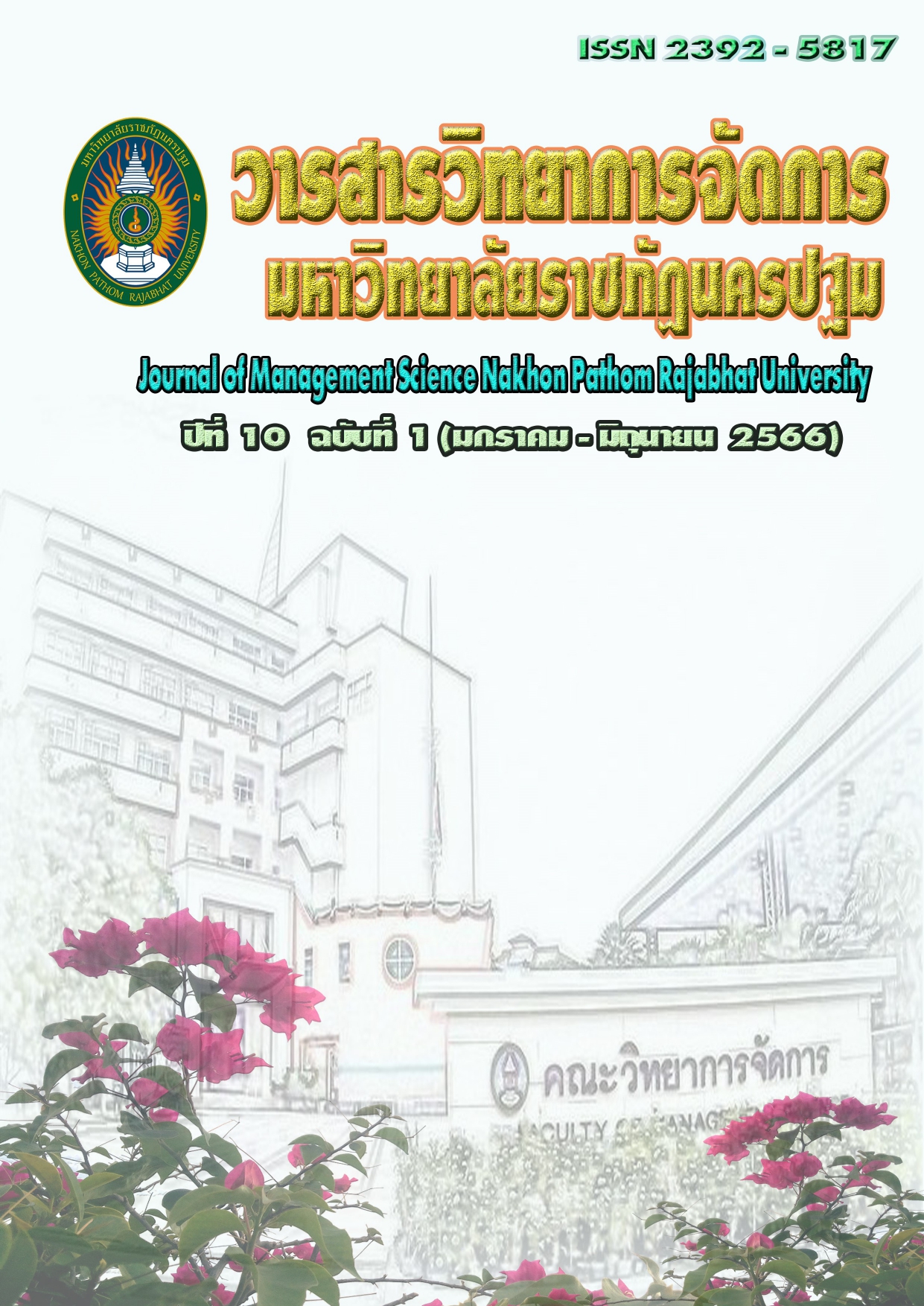The Causal Relationship Model Between Quality of Working Life and Organizational Culture the affect Organizational Commitment of Supporting Staffs of Rajamangala University of Technology Krungthep
Main Article Content
Abstract
This research aimed to: 1) examine the relationship of the developed model with empirical data; and 2) develop the causal relationship model between quality of working life and organizational culture the affect organizational commitment of supporting staffs of Rajamangala University of Technology Krungthep.
The sample was 210 supporting staff of Rajamangala University of Technology Krungthep derived by convenience sampling. Data were collected by an online questionnaire with Google Form and the casual relationship was examined by LISREL.
The research results were as follows: 1) The causal relationship model between quality of working life and organizational culture the affect organizational commitment of supporting staffs of Rajamangala University of Technology Krungthep was consistent with the empirical data with goodness of fit statistics: chi-square test = 55.28, df=42, p-value=.08, GFI=.98, AGFI=.98, SRMR=.01, RMSEA=.02 and 2) quality of working life has positive direct effect and indirect effect on organizational commitment by organizational culture as mediator and organizational culture has positive direct effect on the organizational commitment. All variables in the model can explain 78 % of the variance of the organizational commitment of the supporting staffs.
Article history: Received 19 September 2022
Revised 16 April 2023
Accepted 17 April 2023
SIMILARITY INDEX = 5.39 %
Article Details

This work is licensed under a Creative Commons Attribution-NonCommercial-NoDerivatives 4.0 International License.
The views and opinions of the article appearing in this journal are those of the author. It is not considered a view and responsibility of the editorial staff.
References
กิติยา วงศ์เบี้ยสัจจ์. (2564). วัฒนธรรมองค์การที่มีผลต่อคุณภาพชีวิตการทำงานของบุคลากร บริษัทไปรษณีย์ไทย จำกัด (สำนักงานใหญ่). วิทยานิพนธ์ปริญญามหาบัณฑิต สาขารัฐประศาสนศาสตร์และบริหารธุรกิจ บัณฑิตวิทยาลัย มหาวิทยาลัยรามคำแหง.
จิราภรณ์ สอนดี และ อภิสิทธิ์ ตั้งเกียรติศิลป์ (2564). คุณภาพชีวิตในการทำงานและความผูกพันต่อองค์การของพนักงานมหาวิทยาลัย สาย วิชาการมหาวิทยาลัยศรีนครินทรวิโรฒ. Pathumthani University Academic Journal, 13(2), 559-572.
ชฎาภรณ์ เพียยุระ สามารถ อัยการ และ ชาตติชัย อุดมกิจมงคล. (2565). คุณภาพชีวิตในการทำงานและวัฒนธรรม องค์การที่ส่งผลต่อความผูกพันต่อองค์การของบุคลากรองค์กรปกครองส่วนท้องถิ่นในเขตอำเภอพรรณานิคม จังหวัดสกลนคร. วารสารสหวิทยาการวิจัยและวิชาการ, 2(5), 75-96.
ชไมพร กาญจนกิจสกุล. (2555). ระเบียบวิธีวิจัยทางสังคมศาสตร์. ตาก: โพรเจ๊คท์ ไฟฟ์-โฟว์.
บุญชม ศรีสะอาด. (2556). วิธีการทางสถิติสำหรับการวิจัย เล่ม 1.(พิมพ์ครั้งที่ 5). กรุงเทพฯ: สุวีริยาสาส์น.
ผจญ เฉลิมสาร. (2557). ปัจจัยจูงใจ ปัจจัยค้ำจุน และคุณภาพชีวิตในการทํางานที่ส่งผลต่อความจงรักภักดีของ ผู้ปฏิบัติงานในองค์กร กรณีศึกษาการไฟฟ้าฝ่ายผลิตแห่งประเทศไทย. การค้นคว้าอิสระปริญญามหาบัณฑิต สาขาบริหารธุรกิจ. บัณฑิตศึกษา มหาวิทยาลัยกรุงเทพ.
มณฑิตา ศรีนคร. (2563). ผลของภาวะผู้นำการเปลี่ยนแปลง วัฒนธรรมองค์กรและความผูกพันยึดมั่นในงานที่ส่งผลต่อประสิทธิภาพการทำงานของพนักงานระดับปฏิบัติการ อุตสาหกรรมยานยนต์และชิ้นส่วนยานยนต์ในนิคมอุตสาหกรรมแหลมฉบัง จังหวัดชลบุรี. วารสารวิทยาลัยพาณิชยศาสตร์บูรพาปริทัศน์, 15(1), 120-133.
ยงยุทธ รักษาพล สุมาลี รามนัฏ และ ธัญนันท์ บุญอยู่. (2565). ความผูกพันในองค์กรในฐานะตัวแปรคั่น กลาง ที่เชื่อมโยงวัฒนธรรมองค์กรและการบริการทรัพยากรมนุษย์สู่ประสิทธิภาพในการปฏิบัติงานของพนักงานใน บริษัทอุตสาหกรรมการผลิตเหล็กแห่งหนึ่งในจังหวัดระยอง. วารสารวิจัยมหาวิทยาลัยเวสเทิร์น มนุษยศาสตร์ และ สังคมศาสตร์, 8(1), 31-46.
สรสุดา แก่นจันทร์. (2561). การรับรู้บรรยากาศองค์กร ความผูกพัน ความพึงพอใจในการทำงานที่มีอิทธิพลต่อการแสดงพฤติกรรมการเป็นสมาชิกที่ดีของบุคลากรสถาบันอุดมศึกษากลุ่มใหม่ในเขตกรุงเทพและ ปริมณฑล. วิทยานิพนธ์ปริญญามหาบัณฑิต สาขาการจัดการทั่วไป คณะบริหารธุรกิจ มหาวิทยาลัยเทคโนโลยีราชมงคลธัญบุรี.
สุริมา เกิดสุข และดวงพร พุทธวงศ์. (2564). ปัจจัยจูงใจ ปัจจัยค้ำจุน และ คุณภาพชีวิตในการทำงานที่มีผลต่อ ความผูกพันต่อองค์กรของพนักงาน สถาบันวิจัยวิทยาศาสตร์และเทคโนโลยีแห่งประเทศไทย. UMT-POLY Journal, 18(1), 333-344.
อัจฉรา ภาณุศานต์ และอัควรรณ์ แสงวิภาค (2565). คุณภาพชีวิตในการทำงานและ วัฒนธรรมองค์กรที่มีอิทธิพลต่อความผูกพันองค์กรของพนักงานระดับปฏิบัติการในอุตสาหกรรมโรงกลั่นน้ำมันนิคมอุตสาหกรรมแหลมฉบัง. University of the Thai Chamber of Commerce Journal Humanities and Social Sciences, 42(1), 132-149.
Allen, N. and Meyer, J. (1990). The measurement and antecedents of affective, continuance, and normative commitment to the organization. The Journal of Occupational Psychology, 63 (1), 1-18.
Aminizadeh, M., Saberinia, A., Salahi, S., Sarhadi, M., Jangipour Afshar, P., and Sheikhbardsiri, H. (2022). Quality of working life and organizational commitment of Iranian pre-hospital paramedic employees during the 2019 novel coronavirus outbreak. International Journal of Healthcare Management, 15(1), 36-44.
Anggitaning, K. Y. A., Sapta, I. K. S., and Sudja, N. (2022). The effect of work motivation and quality of work life on organizational commitment and performance of employees at the department of industry and trade in Bali Province. Economist Journal: Scientific Journal of Accountancy, Management and Finance, 2(3), 182-196.
Aranki, D. H., Suifan, T. S., and Sweis, R. J. (2019). The relationship between organizational culture and organizational commitment. Modern Applied Science, 13(4), 137-154.
Astuti, J. P., and Soliha, E. (2021). The effect of quality of work life and organizational commitment on performance with moderation of organizational culture: study on public health center Puskesmas in Gabus district. International Journal of Social and Management Studies, 2(6), 89-99.
Das, B. L., and Baruah, M. (2013). Employee retention: A review of literature. IOSR Journal of Business and Management, 14(2), 8-16.
Desion, D. R., Haaland, S., and Goelzer, P. (2004). Corporate culture and organizational effectiveness: Is Asia different from the rest of the World. Organizational Dynamics, 33(1), 98-109.
Hair, J.F.,Black,W. C.,Babin,B. J. and Anderson, R. E.(2014) .Multivariate data analysis a global perspective (7th ed.). New Jersey: Prentice-Hall International.
Jufrizen, J., Mukmin, M., Nurmala, D., and Jasin, H. (2021). Effect of moderation of work motivation on the influence of organizational culture on organizational commitment and employee performance. International Journal of Business Economics (IJBE), 2(2), 86-98.
Kandasamy, I., and Ancheri, S. (2009). Hotel employees’ expectations of quality of work: A qualitative study. International Journal of Hospitality Management, 28, 328-337.
Kodikal, R., and Rahman, H. U. (2016). Influence of quality of work life on organizational commitment amongst employees in manufacturing sector. International Journal in Multidisciplinary and Academic Research, 5(5), 1-30.
Madden, T. J. and Dillon, W. R. (1982). Causal analysis and latent class models: An application to a communication hierarchy of effects model. Journal of Marketing Research, 19, 472-490.
Natasya, N. S., and Awaluddin, R. (2021). The Effect of Quality of Work Life, Organizational Culture and Job Satisfaction on Employee Engagement. Bina Bangsa International Journal Of Business And Management, 1(2), 158–165.
Rovinelli, R., and Hambleton, R. K. (1976). On the use of content specialists in the assessment of criterion- referenced test item validity. Washington, D.C. : ERIC.
Sarhan, N., Harb, A., Shrafat, F., and Alhusban, M. (2020). The effect of organizational culture on the organizational commitment: Evidence from hotel industry. Management Science Letters, 10(1), 183-196.
Sumarsi, S., and Rizal, A. (2022). The effect of competence and quality of work life on organizational citizenship behavior (OCB) with organizational commitment mediation. International Journal of Social and Management Studies (IJOSMAS), 2(6), 69-88.
Walton, R. E. (1973). Quality of working life: what is it. Sloan management review, 15(1), 11-21.


